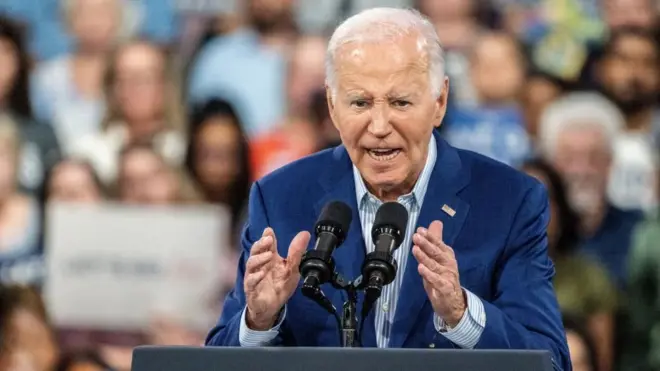Introduction
Recent polls indicate growing concern among Americans about President Biden’s age and its implications for his potential second term. The poll, showing 73% of respondents expressing concerns, including a notable number of Democrats, has spurred a wave of defense from Biden’s allies. They emphasize his extensive experience, legislative victories, and demonstrated stamina in handling the presidency’s demands. This situation brings to light the challenge President Biden faces in tackling perceptions about his age, particularly as the 2024 election draws closer. His age is becoming a central point of discussion, interwoven with considerations about leadership capacity and the evolving expectations of the American electorate.
Key Points
1. Poll Results and Public Perception
A new poll reveals a significant portion of Americans are concerned about President Biden’s age and fitness for office, with 73% believing he is too old for another term, including many Democrats.
2. Biden’s Allies Push Back
Biden’s allies highlight his experience, stamina, and legislative achievements, countering concerns about his age and reinforcing his capability to lead.
3. Broader Societal Conversation
The debate over Biden’s age reflects a broader societal conversation about ageism and the role of older individuals in leadership positions.
Insights
1. Independent Voter Concerns
The poll results indicate that age is emerging as a key vulnerability for President Biden, particularly among independent voters who could be crucial in the upcoming election.
2. Age as a Liability
While Biden’s experience is often cited as a strength, the poll suggests that some voters perceive his age as a liability, potentially impacting his image as a strong and capable leader.
3. Ageism in Leadership
The debate over Biden’s age highlights a broader societal conversation about ageism and the role of older individuals in leadership positions.
Poll Results and Public Perception
The recent poll reveals a significant portion of Americans are concerned about President Biden’s age, with 73% believing he is too old for another term. This concern is not limited to political opponents; a surprising number of Democrats also share this sentiment. The findings underscore the potential impact of age on the 2024 presidential election, highlighting the challenges Biden faces in addressing these concerns and maintaining voter confidence.
Biden’s Allies Push Back
In response to the poll, Biden’s allies and administration officials are emphasizing his extensive experience, stamina, and legislative achievements. They argue that his track record demonstrates his capability to handle the demands of the presidency effectively. By highlighting his significant policy successes and tireless work ethic, they aim to counteract the narrative that his age is a hindrance.
Highlighting Experience
Biden’s long career in public service is presented as a testament to his deep understanding of governance and policy-making. His experience is framed as a critical asset in navigating complex political landscapes.
Emphasizing Stamina
Despite his age, Biden’s allies point to his active schedule and ability to manage the rigorous demands of the presidency. His stamina and dedication to his role are key talking points in defending his fitness for office.
Legislative Achievements
Biden’s legislative victories, including major bills on infrastructure, healthcare, and economic recovery, are highlighted to demonstrate his effectiveness and capability as a leader.
Age as a Vulnerability in the 2024 Election
The concern over Biden’s age is emerging as a key vulnerability, particularly among independent voters who could play a crucial role in the upcoming election. Media coverage and public discourse often amplify these concerns, making it essential for Biden’s campaign to address the issue head-on.
Independent Voter Concerns
Independent voters are crucial in determining election outcomes, and their concerns about Biden’s age could influence their voting decisions. Addressing these concerns effectively is vital for his re-election strategy.
Media and Public Discourse
The media’s portrayal of Biden’s age can shape public perception significantly. Ensuring balanced and accurate reporting is important to prevent the issue from overshadowing his achievements and capabilities.
Addressing the Age Issue
Biden’s campaign needs to develop a clear and consistent message that addresses age-related concerns while emphasizing his qualifications and readiness to continue leading the nation.
The Broader Societal Conversation
The debate over Biden’s age reflects a broader societal conversation about ageism and the role of older individuals in leadership positions. This discourse is crucial in understanding how age-related biases can affect perceptions of capability and competence.
Ageism in Politics
Ageism can lead to unfair assumptions about an individual’s ability to perform their duties based on their age. Addressing these biases is important for fostering a more inclusive and equitable political environment.
Leadership and Age
Historically, many leaders have excelled in their roles well into their later years. Recognizing the value of experience and wisdom that comes with age is essential in evaluating a leader’s capability.
Historical Context
Examining the successes of older leaders throughout history provides valuable context for understanding the potential strengths and contributions of leaders like Biden.
Biden’s Commitment to Re-Election
Despite the poll’s findings, President Biden remains committed to running for re-election. His campaign strategy will need to focus on addressing age-related concerns while highlighting his accomplishments and vision for the future.
Campaign Strategy
Developing a robust campaign strategy that effectively communicates Biden’s strengths and addresses voter concerns about his age is crucial for his re-election bid.
Addressing Concerns
Engaging directly with voters and addressing their concerns about his age and fitness for office can help build trust and confidence in his leadership.
Public Engagement
Increasing public engagement and visibility through town halls, interviews, and public appearances can help reinforce Biden’s commitment and capability to serve another term.
Historical Examples of Older Leaders
Historical examples of successful older leaders can provide valuable insights and counterarguments to concerns about Biden’s age. Leaders such as Winston Churchill, Ronald Reagan, and Nelson Mandela have demonstrated that age does not necessarily impede effective leadership.
Successful Older Leaders
Highlighting the achievements of older leaders can help shift the narrative around age and leadership capability.
Lessons from History
Lessons from history emphasize the importance of experience, wisdom, and resilience that often come with age, qualities that are essential for effective leadership.
Comparative Analysis
Comparing Biden’s situation to other older leaders can provide a more balanced and nuanced perspective on his potential for continued success.
Evaluating Presidential Capability
A fair evaluation of Biden’s capability should go beyond age and consider factors such as health, mental acuity, and policy acumen. This approach provides a more comprehensive and accurate assessment of his fitness for office.
Health and Mental Acuity
Regular health assessments and transparent reporting can help address concerns about Biden’s physical and mental fitness.
Policy Acumen
Biden’s extensive policy knowledge and experience should be emphasized as critical assets in his ability to lead effectively.
Balanced Assessment
A balanced assessment of Biden’s capability should consider a range of factors, including his achievements, leadership qualities, and overall fitness for the role.
The Role of Media in Shaping Perceptions
The media plays a significant role in shaping public perceptions of political leaders. Responsible and balanced reporting is essential to ensure that age-related concerns are presented in context and not disproportionately amplified.
Media Narratives
The media’s portrayal of Biden’s age can influence public opinion. Ensuring accurate and balanced narratives is crucial for fair public discourse.
Impact on Public Opinion
The media’s framing of age-related issues can impact voter perceptions and decisions. Responsible journalism is key to fostering an informed electorate.
Responsible Reporting
Journalists and media outlets have a responsibility to present age-related concerns in a balanced and factual manner, avoiding sensationalism and bias.
Conclusion
The recent poll highlighting concerns about President Biden’s age underscores the importance of addressing this issue in the lead-up to the 2024 election. While age can be a factor in evaluating a leader’s capability, it should not be the sole determinant



